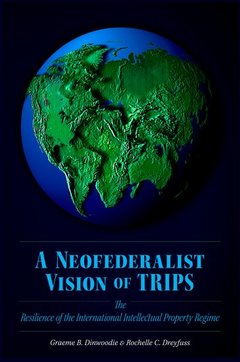A Neofederalist Vision of TRIPS The Resilience of the International Intellectual Property Regime
Langue : Anglais
Auteurs : Dinwoodie Graeme B., Dreyfuss Rochelle C.

The TRIPS Agreement (Agreement on Trade-Related Aspects of Intellectual Property Rights), signed on April 15, 1994, introduced intellectual property protection into the World Trade Organization's multilateral trading system for the first time, and it remains the most comprehensive international agreement on intellectual property to date. A Neofederalist Vision of TRIPS by Graeme B. Dinwoodie and Rochelle C. Dreyfuss examines its interpretation, its impact on the creative environment, and its effect on national and international lawmaking. It propounds a vision of TRIPS as creating a neofederalist regime, one that will ensure the resilience of the international intellectual property system in time of rapid change. In this vision, WTO members retain considerable flexibility to tailor intellectual property law to their national priorities and to experiment with changes necessary to meet new technological and social challenges, but agree to operate within an international framework. This framework, while less powerful than the central administration of a federal government, comprises a series of substantive and procedural commitments that promote the coordination of both the present intellectual property system as well as future international intellectual property lawmaking. Part I demonstrates the centrality of state autonomy throughout the history of international negotiations over intellectual property. Part II, which looks at the present, analyzes the decisions of the WTO in intellectual property cases. It concludes that the WTO has been inattentive to the benefits of promoting cultural diversity, the values inherent in intellectual property, the rich fabric of its law and lore, the necessary balance between producers and users of knowledge goods, and the relationship between the law and the technological environment in which it must operate. Looking to the future, Part III develops a framework for integrating the increasingly fragmented international system and proposes the recognition of an international intellectual property acquis, a set of longstanding principles that have informed, and should continue to inform intellectual property lawmaking. The acquis would include both express and latent components of the international regime, put access-regarding guarantees such as user rights on a par with proprietary interests and enshrine the fundamental importance of national autonomy in the international system.
Preface. Acknowledgements. PART I. Where We Were: The Structure of Intellectual Property and the History of the TRIPS Debate. Chapter 1. The Challenges of the TRIPS Agreement. Chapter 2. The History and Character of TRIPS and how it Shapes the Contemporary Debate. PART II. Where we Are: Dispute Resolution and its Impact on a Neofederalist Vision of TRIPS. Chapter 3. The Dispute Settlement Understanding and Interpretation of the Substantive Features of the TRIPS Agreement. Chapter 4. Interpretation Continued: The Structural Features of the TRIPS Agreement. Chapter 5: TRIPS and Domestic Lawmaking. PART III. Where We Are Headed: Intellectual Property Lawmaking For the Twenty-First Century. Chapter 6: The WTO, WIPO, ACTA, and More: Fragmentation and Integration. Chapter 7: An International Acquis: Integrating Regimes and Restoring Balance. Notes. Index.
Graeme B. Dinwoodie is the Professor of Intellectual Property and Information Technology Law at the University of Oxford. Before returning to the UK, he taught at several U.S. law schools and has also held a Chair at Queen Mary College, University of London. In 2008, Professor Dinwoodie was awarded the Pattishall Medal for Excellence in Teaching Trademark and Trade Identity Law by the International Trademark Association. Professor Dinwoodie is a member of the American Law Institute, and has served as a consultant to both the World Intellectual Property Organization and the United Nations Conference on Trade and Development. He has been Chair of the Intellectual Property Section of the Association of American Law Schools, and is the current President of the Association of Teachers and Researchers in Intellectual Property Law (ATRIP). Rochelle C. Dreyfuss is the Pauline Newman Professor of Law at New York University School of Law and Co-director of the Engelberg Center on Innovation Law and Policy at NYU. She is a member of the American Law Institute and was a co-Reporter for its Project on Intellectual Property: Principles Governing Jurisdiction, Choice of Law, and Judgments in Transnational Disputes. She is presently serving on the Academies' Committee on Science, Technology, and Law.
Date de parution : 05-2012
Ouvrage de 288 p.
16.4x23.7 cm
Disponible chez l'éditeur (délai d'approvisionnement : 21 jours).
Prix indicatif 140,09 €
Ajouter au panierThème d’A Neofederalist Vision of TRIPS :
© 2024 LAVOISIER S.A.S.
